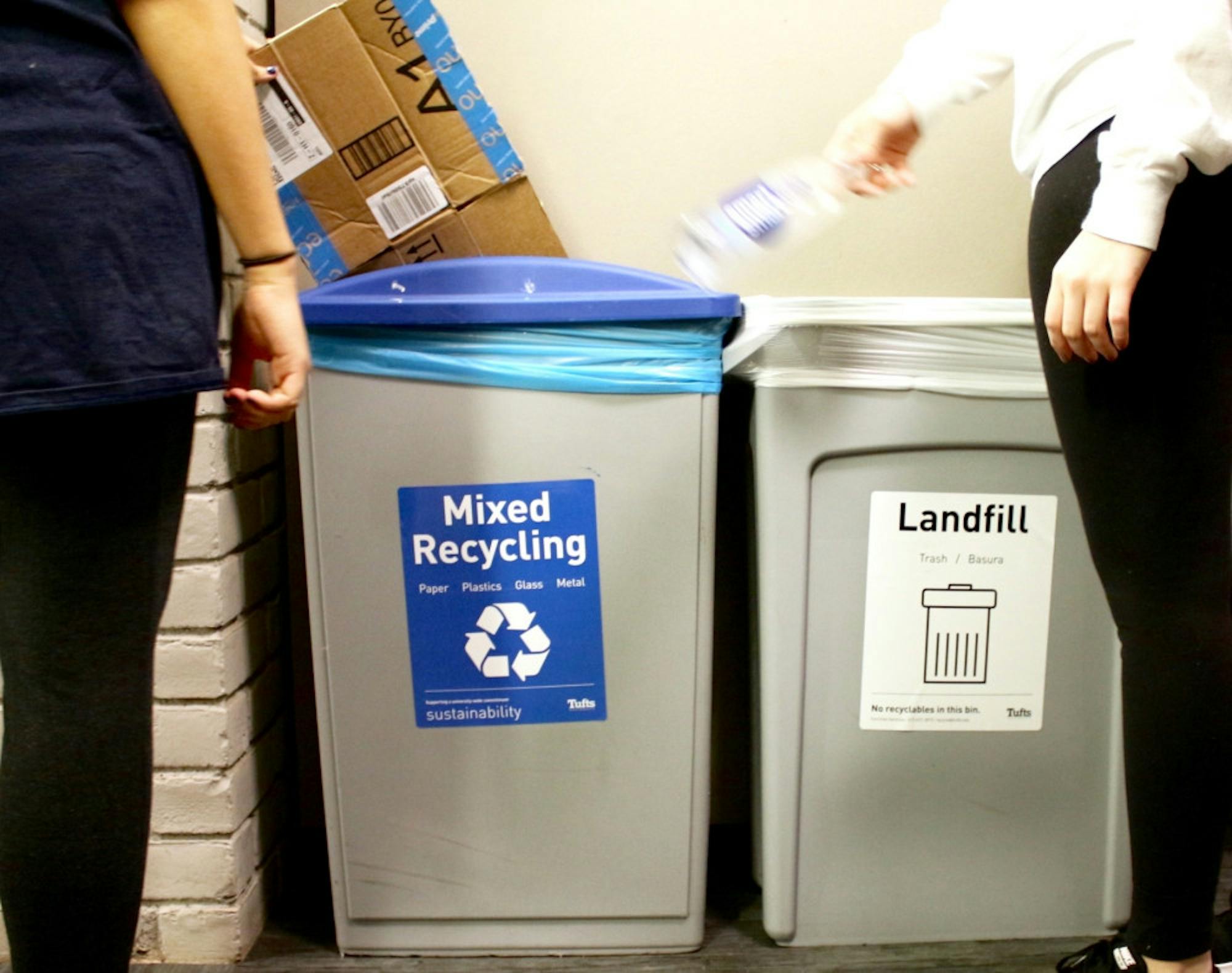Starting this semester, Tufts will begin transitioning to a mixed recycling system, a change from the previous dual stream recycling system, according to Director of Campus Services Gary Hill.
Over winter break, Facilities Services began the transition on the Medford/Somerville campus by placing new lids on waste bins and replacing nonstandard bins, according to Kate Doherty Bolivar, Facilities Services supervisor.
According to Hill, the School of the Museum of Fine Arts at Tufts will switch to mixed recycling in the coming month, and both the Grafton campus and the Boston Health Sciences campus will likely make the change over the summer of 2017.
Bolivar is managing the infrastructure development, planning and roll-out of mixed recycling for Tufts’ four campuses. Bolivar said that, while some glitches occurred along the way in the timing of the process, the transition is moving forward and she expects it to be completed by February.
While Facilities Services is carrying out the physical changes and logistics of the switch to mixed recycling, the Office of Sustainability is assisting with outreach, education and marketing for the mixed recycling transition, according to Program Director of the Office of Sustainability Tina Woolston.
Woolston noted that mixed recycling, also known as single stream recycling, is more convenient for consumers than dual stream recycling as it streamlines the decision-making process.
“Whereas dual stream recycling requires separating glass, metal and plastic recyclables from paper and cardboard and capturing them in separate bins, or ‘streams,’ mixed recycling is when you collect all [of] those same materials in a single ‘stream’ and put them together in a single bin,” Woolston told the Daily in an email.
According to Woolston, the new waste stations consist of only two bins: one gray bin for trash, and one gray bin with a blue lid for mixed recycling.
Multiple factors went into the decision to switch to mixed recycling, according to Hill.
“In addition to improving the recycling collection process to make it more user-friendly, the university is preparing for a new multi-year waste and recycling contract, which will require the successful vendor to collect recycling from Tufts as mixed recycling,” Hill said. “It simply made sense to have the communications and labeling developed and the infrastructure transitioned as much as possible prior to a new contract."
Woolston emphasized that the new recycling system is important for the school's larger sustainability efforts.
“We have labeled our trash bins with the word ‘landfill’ to remind the Tufts community that trash doesn’t simply go ‘away’ - it goes somewhere that’s not pleasant," Woolston wrote. "Some of our trash gets sent to a waste-to-energy plant, where it’s burned to produce energy, but even the ashes and unburnt residue ultimately end up in a landfill somewhere.”
Like Woolston, Hill also explained the impact that this change will have on Tufts' waste reduction goals.
“By implementing the change, it not only demonstrates the University’s commitment to mixed recycling for the vendors bidding the contract," he said, "but [it] also clearly supports Tufts' commitment to the environment, [to] implementing methods designed to increase diversion rates from the landfill and [to] practicing progressive sustainability methods."
Woolston said that, in preparation for the new recycling system, Tufts has tested its mixed bins for the past several months. In particular, Eco-Reps and Facilities Services interns have solicited feedback from students to ensure that the transition is successful.
While university officials expect the change to mixed recycling to benefit the Tufts community and the environment, Woolston noted a few concerns.
“Because more items can go into one bin and less thought is needed when sorting, mixed recycling could potentially lead to more contamination of our recycling,” Woolston wrote.
Woolston added that liquids and food must also be kept out of the recycling so that all recycled items remain clean and dry.
“For example, if you throw a full coffee into the mixed recycling bin, the coffee will soak the paper, preventing the paper from actually getting recycled,” Woolston wrote.
The concern of food, liquid and paper mixing did not arise before the change, since paper was kept in a separate bin, Woolston explained.
She added that different tactics were put into place to help save money and reduce potential waste created from the transition, such as repurposing the blue lids from the former paper recycling bins.
“An 8-inch hole was cut in the top to create the traditional UFO-shaped mixed recycling lid. The larger hole can accommodate long, thin paper, cardboard items...round bottles, cans and larger plastic takeout containers...you get at Hodgdon," Woolston wrote. "This helps people dispose of more items without having to lift the lid, which has been a long-standing complaint."
University President Anthony Monaco, who chairs the Campus Sustainability Council, explained that the switch to mixed recycling supports Tufts’ waste reduction goals, including the Sustainability Council’s target to reduce total waste by approximately three percent per year.
“Tufts has taken a significant step forward with the introduction of mixed recycling, which makes recycling easier and our recycling program more efficient," Monaco told the Daily in an email. "Mixed recycling helps the university meet the waste reduction goals set as part of our sustainability efforts and, therefore, it is better for the environment. I hope everyone in our community will embrace the change and do their part to help."
CORRECTION AND CLARIFICATION: An earlier version of this article stated that the new mixed recycling bins are blue. They are actually gray with blue lids. Additionally, the article stated that the university will adhere to the new recycling system on all four campuses this semester, but later specified in the same article that the recycling system will not go into place on the Boston and Grafton campuses until summer 2017. The latter statement is correct. The article has been updated to reflect these changes. The Daily regrets these errors.
Mixed recycling newly implemented at Tufts






